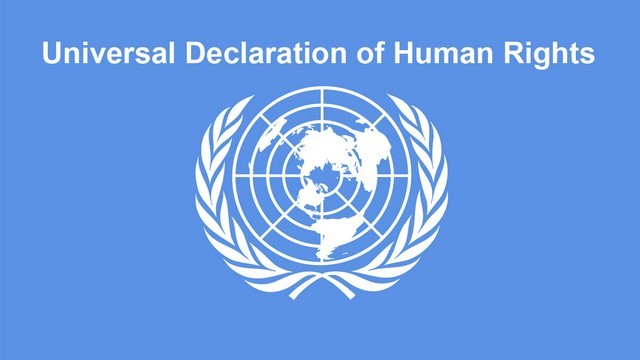By Chandra Muzaffar
As we observe the 70th anniversary of the adoption and proclamation of the Universal Declaration of Human Rights (UDHR) by the UN General Assembly on the 10th of December 1948, it is imperative that we remind ourselves of the vital importance of Human Duties and Responsibilities in the life of a society. In fact there is a profound link between rights, on the one hand, and duties and responsibilities, on the other. It is a link that is acknowledged in almost every religious philosophy.
This is why in 1947 Mahatma Gandhi when asked to contribute his thoughts to the UDHR that was being drafted at that time wrote in a letter to the Director of UNESCO, “I learned from my illiterate but wise mother that all rights to be deserved and preserved come from duty well done.” Similarly, the Confucian scholar, Wu Teh Yao who was involved in the preparatory work that went into the formulation of the UDHR tried to convince his colleagues that it would not be judicious to produce a document that only emphasised rights without giving equal attention to responsibilities. The contemporary Islamic thinker, Seyyed Hossein Nasr has also argued that rights should emanate from responsibilities.
Over the decades there have been attempts to integrate rights with duties and responsibilities. The most notable of these is the Universal Declaration of Human Duties and Responsibilities (UDHDR) proclaimed in Valencia in 1998 to commemorate the 50th anniversary of the UDHR. The UDHDR was initiated and developed by former heads of State and heads of Government, Nobel Laureates and experts and contains 12 chapters and 41 articles. It not only emphasises our responsibility to uphold human rights but also elaborates on our responsibility to ensure integrity, a decent standard of living, human security, the right to participate in public affairs and to build an equitable international order. It is a pity that the UDHDR has been given very little attention by the international community.
And yet human duties and responsibilities have become far more crucial today than ever before. A brief look at five spheres of society will convince us of this. If the present generation is confronted by a monumental environmental crisis, underscored by the vagaries of climate change, it is partly because we human beings have not been faithful to our responsibility to protect our planet. Likewise, if corruption and abuse of power among elites is more pervasive now than in the past, it is because some of them lack a sense of responsibility to those they govern manifested through the ease with which they trample upon the ethic of honesty and accountability. It is because we do not feel that we have a duty to look after our fellow human beings that we have allowed an economic and financial system to evolve that concentrates wealth in the hands of a few to the detriment of the many. Hatred and bigotry that targets the religious or cultural ‘other’ has gained much more currency in recent years for a variety of reasons among them, a dearth of respect for human beings who are not part of one’s own tribe, an inability to understand that in this day and age we have a duty to appreciate, even celebrate, ethnic differences. It may be because many of us have no commitment to responsibility as a value and a principle that we have no qualms about misusing the new modes of communication to spread lies, to peddle half-truths and to distort realities.
Our collective failure to adhere to our responsibilities and to fulfil our duties has imperilled our civilisation. It has brought humankind to the brink of catastrophe. How do we arrest our decline as a species?
To instil a deep sense of responsibility in the human being, one has to begin with the family. It is the most effective institution for inculcating those habits and practices that enhances one’s sense of duty. The entire education process from the kindergarten to the university has also got a critical role to play. Social and cultural activities and the media can make a huge contribution to the challenge of creating an atmosphere that sustains the ethic of responsibility. Political leaders and other elites should also demonstrate through ‘other-serving’ deeds their commitment to duty rather than to their own self-interest. This will have an exemplary impact upon society.
Finally, religion also has the potential to strengthen a sense of responsibility and a commitment to duty in the individual and her community if it moves away from its current obsession with form and identity. If it is perceived and practised as values and principles rooted in an understanding of life and its purpose that goes beyond self in the narrow sense, faith in God can become a powerful conduit for the fulfilment of a profound responsibility that centres on selfless service to humanity. It is then that life itself becomes a sacred responsibility, a precious gift from God, while the way we live becomes our gift to God.
Dr. Chandra Muzaffar is the President of the International Movement for a Just World (JUST).
Malaysia.
9 December 2018.

